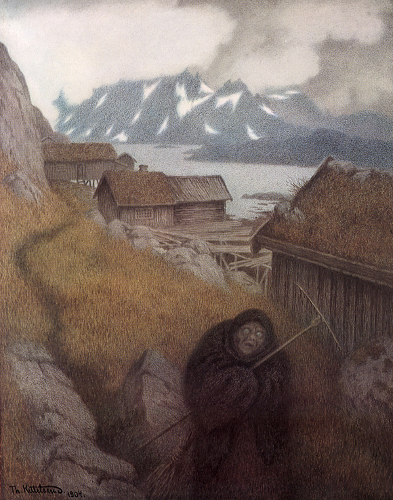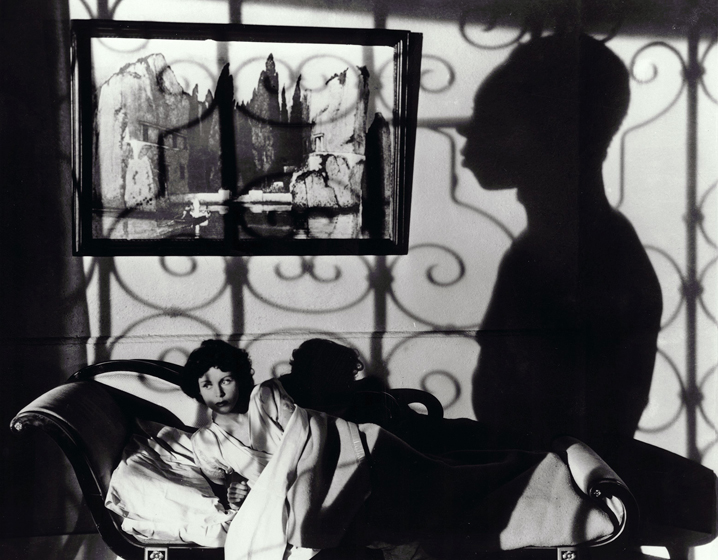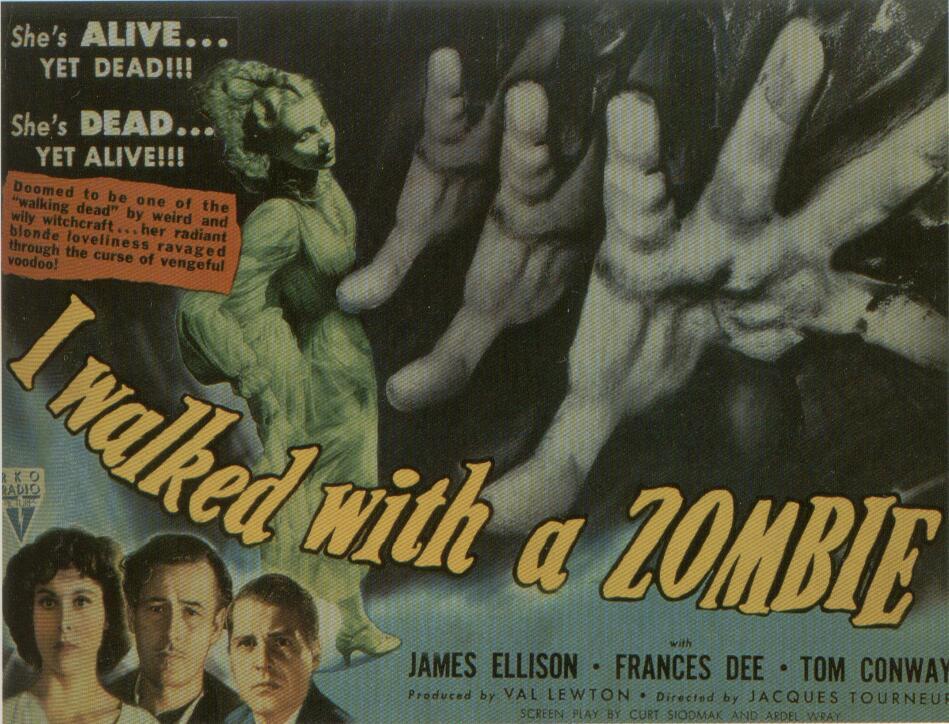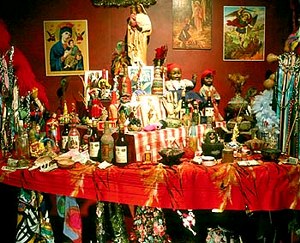ZOMBIE: Dream or reality?
It is one of those rare Swedish summers when it seldom rains. The sunshine, the heat and the liberty demand swims in the lake and relaxation in the hammock. Furthermore, this year I have the pleasure of having parts of my family around me. However, as so often in Sweden, "to have a good time in the countryside" means hard work and this summer has in that regard been tougher than usual; cleaning up of my mother's house has been followed by the cleaning up of our house in Bjärnum.

However, this does not mean that I do not appreciate such activities. After a hard day's work it is a pleasant to be confronted with visible outcomes, like when decades of accumulated trash has disappeared from the carpenter shed and the guest house smells fresh and looks inviting. It is especially enjoyable to plunge into the lake's invigorating freshness after clearing entangled bushes from our extensive thickets and being able to share feelings of accomplishment with members of my family. Unfortunately, there has not been much time left for blog writing, something that has turned into a habit and an appreciated form of relaxation.
One of my best friends, who furthermore is a faithful reader of my blog, asked me if I would not write down the ghost story I told at Hovdala Castle. For two reasons I hesitate to do so. Foremost is that I was carried away while taking at the Castle and thus did not reflect upon the fact that my wife might have been bothered by the fact that I in front of strangers and without her blessing told them about her experiences.
I understand such a feeling. I may sometimes feel that my personal integrity has been invaded if someone else explains my feelings and experiences to strangers. Somehow it makes me lose control over my own life, particularly if it is done against my will.
The ghost story I told at Hovdala was mostly my wife's story and afterwards she pointed out that I had got some details wrong, like the fact that the man in her dream had not been naked, but dressed in black. Nevertheless, I'm not entirely sure whose memory was failing. I wrote down the dream shortly after my wife had told it to me, and for safety's sake I now repeat a passage from an article I wrote more than fifteen years ago and got published in a Swedish magazine. That article is not easy to come across and I do not have any copy myself, since I recently found the magazine in my mother's house I assumed it could be a good idea to reproduce it on my blog.
As I now once again tell the story I partly do so because I consider story telling as an act of reproduction and reformulation not only of my own stories, but also those of my fellow human beings. Retelling other people´s experiences is maybe after all not an offensive act, it may to some extent just as well be a sign of respect, a recognition of how much I value the experiences of others, a realization that their experiences and thoughts have become an integrated part of my own life and self-perception.
Like many Buddhists, I believe that a person's consciousness is nothing else but the sum of various thoughts and emotions that have come to him from the outside. Within me I carry a specific character and personality that to a large degree is constituted by other people's impressions and stories. While retelling my wife's story it is not only her story I communicate, it is also mine - her experiences have been filtered through my consciousness. I do not judge her, nor do I invite others to do so, I am only interpreting her story. What I write is not about her, it is nothing else than my perception and interpretation of her experiences.
Unfortunately, writing about other people and their experiences becomes part of something that might be called “the author´s curse”. A story teller always runs the risk of being wrong about something and might even hurt people s/he does not have any intention to hurt. As the Swedish author Fritiof Nilsson stated: “You write about a needle and a one-eyed fellow becomes upset”. Every day we reproduce interpretations of other people's experiences and reflections and I believe that no one can be so unique that s/he would be able to avoid doing that.
While writing about zombies I presume I need to present an objection and offer a defense. Talking about Haiti and zombies is not an entirely innocent activity. Haiti and its people have for centuries been suffering from prejudiced judgments of strangers. Writers, priests and politicians have depicted Haiti as a nest for all sorts of primitive superstition. The population´s mainly African origins have been used as an excuse to demonize its rich and fascinating culture.
Vodun, which like any other religion is a deeply human phenomenon and thus reflects both the lowest and the highest in human reasoning, has been used to fuel grotesque generalizations and misconceptions, characterized by either stupidity or malice and has often resulted in the demonization of an entire nation. A nasty caricature of Vodun has been used to defend violence, oppression and abuse. Haitian culture has been equated with black magic, all kind of foul evilness, cannibalism, promiscuity and all conceivable smear of a world view and ritual behavior that I myself have experienced as fascinating and not the least emotionally and intellectually enriching.
When I now tell you a Haitian zombie story I do so to fascinate my readers, but I certainly do not want to contribute to any sensationalistic besmirching of Haiti and its people. Rather I see my story as part of a centuries-old tradition. As when Swedes told stories about, and believed in, elves, goblins, ghouls, trolls and mylingar. To read and hear about Haitian zombies is to me the same thing as reading Swedish stories and legends about black magic, witchcraft and sorcery. For example, the Swedish ethnologist Ebbe Schön's unfortunately untranslated books about elves, gnomes and other beings are equally fascinating and eerie reading as any description of the dark side of Haitian folklore. I cannot see how Swedish horror stories could somehow have negatively influenced my views of Swedes and their delusions.

All this said, I do not want the reader of the following story to imagine that a Haitian who talks about and believes in zombies is much more different than a Swedish peasant who not long ago believed in mylingar and trolls. They both depict a reality that many of us have lost and are no longer a part of, but their stories and beliefs do not affect their human dignity. We are all equal and can all learn from one another.
“It was the first time we visited Port-au-Prince, Haiti's capital. My wife and I had in the late afternoon, tired and dazed after the day's events, arrived at a hotel in the city center. We were offered a room that we could not possibly accept. The bed sheets were wet and the whole place stank at stuffiness, moisture and mold. We insisted on getting another room. For a moment the hotel staff stayed in the doorway, talking among themselves, gesturing indecisively. They discussed in Creole and there was not much we understood. Obviously one of them suggested that we could get a different room, while the others seemed to imply that the room he proposed was associated with some kind of problem. Finally, they asked us to follow them, collected our luggage and showed us to a different room.
It was dark in there. A humming and hissing air conditioner filled up the little window and prevented the daylight from entering. While two porters placed our bags inside the new room, the receptionist switched on the ceiling lights. The room was somewhat strange, but clean and tidy. Dark brown panels covered the walls. The floor consisted of blue tiles. Towels with a fresh and clean scent hung in the well-scrubbed bathroom. The sheets were laundered and dry. We explained we were happy with the room, excused the trouble we had caused and thanked for the replacement. However, the receptionist kept a gloomy look on his face while he let his eyes wander around the room before he answered, reiterating that the room was actually reserved, but as the guest had not appeared we were free to occupy it, but only for a night. Not for any longer period of time. He handed me the key, refused to accept any tip and quickly disappeared along the corridor.
We were quite tired and went straight to bed. Soon my wife was sound asleep slept, but I could not sleep at all. To dim the lights I put a towel over the bedside lamp and began to read. It was our first night in Haiti and my anticipation for what lay ahead was great.
Suddenly, my wife woke up with a start and grabbed me tightly by the arm. For a moment, she looked disoriented.
- I had a nightmare! she explained. Have you been awake all the time?
- Sure, I replied.
- It felt real. It was not at all like a dream.
- What do you mean?
- I dreamed that I woke up. It was dark in the roo- It felt real. It was not at all like a dream.m. Did you turn off the lights?
- No, my lamp was lit all the time.
- I saw a light coming in from under the door. Silently and very gently the door opened. A tall, black man came into the room. He was naked and walked with his back turned to me. Slowly, slowly, he approached the bed. I was paralyzed by fear and lay with my head pressed against the pillow. While I watched the dark figure approaching I glimpsed out of the corner of my eyes how something white gleamed by the edge of the nightstand. Small, white fingers reached up over the tabletop. They were followed by the hands. But, that was all. No arms, no body. Only hands. Nothing else. They were moving by themselves. Like the white spiders crawling over the tabletop at the same slow speed as the black man. He advanced relentlessly until he stopped by the edge of the bed and very slowly began moving his head. At the same time the hands had reached the middle of the bedside table. They were smaller than children’s hands and shimmering as if they were made out of porcelain. One of them placed itself with the palm up. The intruding man continued to slowly turn his head, but I could still not see his face. Everything was moving in slow motion. The other hand crept up on the top of the palm of the hand that lay with its back down. The hands closed around each other in a tight grip. When this happened the naked man turned his face back towards the door and slowly left the edge of the bed. While the man was moving towards the door the hands loosened their grip and moved apart. The man disappeared out the door, which noiselessly closed behind him. That's when I woke up.

Her story worried me. In all its strangeness the dream had a certain logical clarity. I could not explain why I thought so, but it was its obvious logic that scared me. We agreed that the tumultuous experiences of the day of our arrival had left its imprint and within my wife's subconscious they had evoked forgotten stories about voodoo, zombies and black magic. We had simply seen too many bad horror movies, though it was in fact more I than my wife who was addicted to such tales. However, I was not really satisfied with that explanation. I imagined that the dream had a sort of sense, but my interpretation attempts went nowhere.

One year passed. At that time we lived in Santo Domingo, the Dominican Republic's capital city. I taught art history and religion at a university and sometimes I devoted the afternoons to seek out different brujas, voodoo mediums, to photograph their altars and interview them about their beliefs and rituals. I was always well received, and the kind ladies were all eager to explain their dealings and relationship with what they called "the other realm".
I and my wife had one evening ended up in the home of a lady who had a voodoo altar in her bedroom. It looked like most of the house altars I had come across in the Dominican Republic and Haiti. On a sheet stretched over the wall behind the altar table the lady had with pins set up the usual colored oleographs. There was Santiago, whose white stallion under its hooves trampled vanquished Moors. Santiago is both Catholic saint and a voodoo deity. As a voodoo lua he is Ogu Balerndyó and may be described as an incarnation of all male virtues. Beside him was a picture of Saint Patrick in the process of banishing the snakes from Ireland. The Irish saint also has voodoo counterpart - Damballah, the powerful serpent god, incarnation of the rainbow and guardian of hidden treasures. There was also the Virgin Mercedes, who surrounded by jewelry and perfume bottles gets her heart pierced by a dagger. In voodoo, La Mercedes is identical to the luxury obsessed love goddess Metré Silí. There were several other pictures of saints attached to the wall, all with double meanings and peculiar features.

The table top was covered with a white lace cloth, cluttered with paper flowers, oil lamps, bottles of eau de cologne, blessed water in multicolored glass flasks, rum and soda bottles, rattles and brass bells adorned with satin ribbons in different colors, plaster doves, prayer books, rosaries, saucers with candies, cinnamon sticks, honey and biscuits. Amid this welter of different objects we saw something that made us wince. On a white saucer the lady had placed two little hands cut out from white paper, between their palms we glimpsed bunches of dried herbs.
- What is that? I wondered, remembering the Haitian dream.
The lady smiled.
- Oh, those are Las Manos Poderosas, The Mighty Hands.
- The Mighty Hands?
- Yes, God's hands. I place herbs between them so they may obtain part of the divine power. Then I boil tea on the herbs and serve it to those who seek me out to help them with their problems. It is very effective.

"The Mighty Hands." Could it be those that my wife had dreamed about? If that had been the case - what was their relation to the naked man's appearance and disappearance? A possible explanation was provided a few months later. We had ended up in a garage located in a typical American suburb outside of Mayagüez in Puerto Rico. A male brujo had at my request conducted an unusually impressive voodoo seance and when my sister in law and wife had left me and the brujo alone after the tumultuous experience, he invited me for a drink on his veranda. I assumed I had met an expert on most things concerning "the other realm" and on a whim I asked him if he could be able to interpret the dream. The brujo laughed at my request:
- Nothing could be more simple. Do you know what a zombie is?
I thought for a moment before I answered:
- Not really.
The brujo took a sip of his drink and began to explain:
- Every man has two souls. The one we spiritualists call "The Big Good Angel" and another one called "The Little Good Angel". It is probably easiest for you to imagine a man´s two souls if you think about of how it is when you are asleep. Then the little angel leaves your body to wander freely through the world and the other realms. What he sees and experiences we call dreams. The big angel however remains in your body. He is locked up and cannot get out. We may call him the body janitor who must attend to all the routine chores of the body. If he does not do that, we die. It is the big good angel who takes care of our breathing, our heartbeat and digestion. He is never allowed to rest. However, he does not suffer from his heavy duties. The big good angel has no will of his own. He does not know anything other than how to perform of his duties. It's the little good angel who decides everything. The big one does everything the little one commands him to do. We may call the little angel your personality. He looks the same as you do and he acts like you. During the day, the big angel is the little one's slave and when the little one is gone during the night the big angel does not dare to do anything else than what he is ordered to do. He cannot make any decisions of his own.

- And what does all that have to do with my wife's dream?
- Everything. It was a zombie who visited your room during that night in Port-au-Prince.
- But, it was a dream. Nothing more.
The brujo smiled again.
- It is you who say so. Not me. Do you want to know what a zombie is?
I nodded and he leaned forward.
- When a person dies the little good angel is relieved. He moves into the other realm. However, it always takes time before a corpse rots. Do you know why?
- The big good angel still lingers within the body?
The brujo leaned back and smiled as if he had received a cleaver response from a bright pupil.
- Quite right. As I told you, the big angel is an unusually stupid creature. He does not know what he wants and where to go when his master, the little good angel, has left him all alone in a dead body. The big angel remains in there, bewildered and heartbroken. It is now the bokor enters our story.
- The bokor?
- Let's call him an evil wizard. Someone who works with both hands. His one hand does not know what the other one is doing. The bokor gets paid to cause damage to our fellow beings. He uses his evil powers to submit big good angels to his will, those who confused linger on in a deceased person's body. During dark nights the bokor sneaks out into the graveyards, in search of newly dug graves. He kneels down and whispers into the earth to find out if there are any big angels trapped in corpses down under. If a big angel answers the call of a bokor he is trapped. The bokor captures him, dominates him with his evil will and forces him to carry out sinister errands. With a big angel a bokor is able to invigorate a corpse and make it abide all his commands. A corps animated by a big angel functions like a robot and is entirely under command by the evil bokor. "Kill" commands the bokor and the big good angel directs the enlivened corpse towards an intended victim. The body has become a zombie, a cadaver without thoughts, a body controlled by the evil will of a bokor.
The brujo took another sip of his drink.
- You were first shown into a room you did not want stay in. Right?
I nodded.
- Where you ought to have remained. That was the room allotted to you. The other room was reserved for someone else. Someone who had a labor directed against him.
- A labor?
- Yeah, that is what it is called among us. Somewhere inside the hotel there was a bokor. He wanted to kill the one who was supposed to be in the room where you ended up. Through the corridors the zombie moved, searching his prey. He went backwards and only showed the whites of his eyes. They say eyes are the mirror of the soul and the bokor is the zombie's soul. He controls the zombie´s moves like an excavator operator controls his machine. The bokor does not want to be seen. He does not want that his existence is revealed. Staring a zombie right into his eyes means that you may detect the presence of a bokor in there and you may thus use your own superior will and force to subdue the bokor, get him to give up his evil schemes and turn his own weapon against him by dominating his zombie. The bokor is afraid of that possibility and thus forces his zombie to hide his pupils, either by only showing the white of the eyes, or walk backwards. The zombie came into your room. He was a living corpse walking backwards. He came to kill. However, the imminent danger awoke your wife's hidden forces. Without knowing it she harbors and is protected by "The Seven African Powers". It was they who turned to the "Great Power of God" and made it come to her rescue. The Mighty Hands are the hands of God. They became your protection against the powers of darkness. When they closed their power was at its greatest. Against the powerful hands a zombie is incapable of doing anything and the bokor who controls it becomes harmless. He even runs the risk of being killed by his own creature. The zombie returned and we do not know what happened to the evil bokor.

What could I answer to all that? I thanked the brujo for his explanations and returned home. More bewildered than before, thinking about Hamlet´s words to his friend: “There are more things in heaven and earth, Horatio, than are dreamt of in your philosophy.”
As essential literature about Haitian zombies it is common to find the books of Wade Davis, a Canadian ethnobotanist. However, I find his books, particularly his popular The Serpent and the Rainbow, to be almost unbearably jingoistic. The researcher is his own hero, a fearless outdoorsman and academic genius who moves around in an over dramatized Haitian wilderness populated by sly magicians, while he makes great discoveries that mostly are already well known. In short, the usual sensationalistic imaginative writing that many authors fall victims to while writing about Haitian religion. Wade Davis true colors are proved by the fact that this “explorer-in-residence at the National Geographic Society” sold the movie rights to The Serpent and the Rainbow to Wes Craven, who made a deplorable horror flick out of it. Nevertheless, some interesting facts may be fished out of the books: Davis, Wade (1985). The Serpent and the Rainbow. New York: Simon & Schuster, and Passage of Darkness: The Ethnobiology of the Haitian Zombie. Berekeley: University of North Carolina Press, 1988.
Thousands of books have been written about Haitian vodun (the word is written in at least six different manners), some deplorable, others excellent. An fine introduction to this vast field might be Hurbon, Laënnec (1995). Voodoo: Search for the Spirit. New York: H.N. Abrams. I still like the first book I read about vodun: Métraux, Alfred (1959) Voodoo in Haiti. Oxford University Press.







